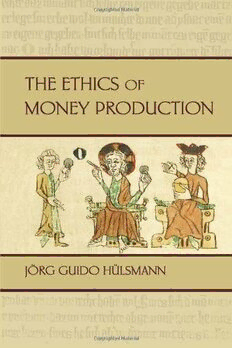Download The Ethics of Money Production PDF Free - Full Version
Download The Ethics of Money Production by Guido Jorg Hulsmann in PDF format completely FREE. No registration required, no payment needed. Get instant access to this valuable resource on PDFdrive.to!
About The Ethics of Money Production
This pioneering work, in hardback, by J?¶rg Guido H??lsmann, professor of economics at the University of Angers in France and the author of Mises: The Last knight of Liberalism, is the first full study of a critically important issue today: the ethics of money production. He is speaking not in the colloquial sense of the phrase "making money," but rather the actual production of money as a commodity in the whole economic life. The choice of the money we use in exchange is not something that needs to be established and fixed by government. In fact, his thesis is that a government monopoly on money production and management has no ethical or economic grounding at all. Legal tender laws, bailout guarantees, tax-backed deposit insurance, and the entire apparatus that sustains national monetary systems, has been wholly unjustified. Money, he argues, should be a privately produced good like any other, such as clothing or food. In arguing this way, he is disputing centuries of assumptions about money for which an argument is rarely offered. People just assume that government or central banks operating under government control should manage money. Hulsmann explores monetary thought from the ancient world through the middle ages to modern times to show that the monopolists are wrong. There is a strong case in both economic and ethical terms for the idea that money production should be wholly private. He takes on the "stabilization" advocates to show that government management doesn't lead to stability but to inflation and instability. He goes further to argue against even the theoretical case for stabilization, to say that money's value should be governed by the market, and that that the costs associated with private production are actually an advantage. He chronicles the decline of money once nationalized, from legally sanctioned counterfeiting to the creation of paper money all the way to hyperinflation.
Detailed Information
| Author: | Guido Jorg Hulsmann |
|---|---|
| Publication Year: | 2008 |
| ISBN: | 1933550090 |
| Pages: | 293 |
| Language: | English |
| File Size: | 0.923 |
| Format: | |
| Price: | FREE |
Safe & Secure Download - No registration required
Why Choose PDFdrive for Your Free The Ethics of Money Production Download?
- 100% Free: No hidden fees or subscriptions required for one book every day.
- No Registration: Immediate access is available without creating accounts for one book every day.
- Safe and Secure: Clean downloads without malware or viruses
- Multiple Formats: PDF, MOBI, Mpub,... optimized for all devices
- Educational Resource: Supporting knowledge sharing and learning
Frequently Asked Questions
Is it really free to download The Ethics of Money Production PDF?
Yes, on https://PDFdrive.to you can download The Ethics of Money Production by Guido Jorg Hulsmann completely free. We don't require any payment, subscription, or registration to access this PDF file. For 3 books every day.
How can I read The Ethics of Money Production on my mobile device?
After downloading The Ethics of Money Production PDF, you can open it with any PDF reader app on your phone or tablet. We recommend using Adobe Acrobat Reader, Apple Books, or Google Play Books for the best reading experience.
Is this the full version of The Ethics of Money Production?
Yes, this is the complete PDF version of The Ethics of Money Production by Guido Jorg Hulsmann. You will be able to read the entire content as in the printed version without missing any pages.
Is it legal to download The Ethics of Money Production PDF for free?
https://PDFdrive.to provides links to free educational resources available online. We do not store any files on our servers. Please be aware of copyright laws in your country before downloading.
The materials shared are intended for research, educational, and personal use in accordance with fair use principles.

